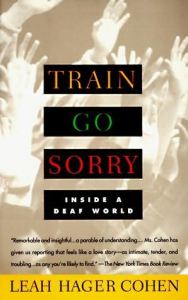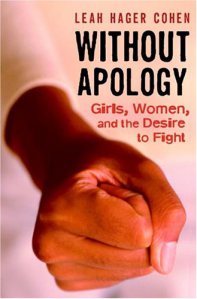Leah Hager Cohen is the author of four non-fiction books, including Train Go Sorry and Glass, Paper, Beans, and three novels, most recently House Lights. Among the honors her books have received are New York Times Notable Book (four times); American Library Association Ten Best Books of the Year; Toronto Globe and Mail Ten Best Books of the Year; and Booksense 76 Pick. She is also a frequent contributor to the New York Times Book Review. More at http://www.leahhagercohen.com/.
***
UFR: You’re a writer of both fiction and nonfiction. On one hand you have novels such as House Lights and Heat Lightning and on the other you have The Stuff of Dreams and Glass, Paper, Beans. How do you negotiate between the two genres? What do you like about each? How do you choose which genre to pursue? Does one do something that the other can’t?
Cohen: I don’t feel there’s any negotiation involved, in the sense of resolving a point of difference. I am happy to let fiction be fiction and nonfiction be nonfiction (even though it has such a poor little word to go by – nonfiction: really, who came up with that?). I like – this is silly and obvious – but I like, in fiction, getting to make things up, and I like, in nonfiction, getting to root things out. Both processes are about discernment, and I don’t privilege one above the other.
UFR: Your book Train Go Sorry is especially striking, I think, because there’s this sense that this was something you needed to write, something that needed to happen, in part because of its wonderful texture and depth. Your narratives are like collages. I have no doubt that the same sort of distinction is true of the rest of your work. Does this depth happen naturally or do you plan out and outline material?
Cohen: I never meant to write Train Go Sorry at all. Part of me was loathe to write it, to turn the lens on something so close to home. I wrote it because of my wonderful and generous journalism professor who told me, while I was still his student, that I was ready to write a book, and that the book I could viably write for publication was this one, because the story hadn’t been told before and I had unusual access to report it. (I was 23, with no previous publications or experience, so to get a book contract it would be important to propose a story that I could say I was singularly equipped to tell.) This mentor essentially delivered me to his agent, an equally wonderful and generous man, and with the two of these lovely guardian-angel-cum-muses urging me on, I plunged into doing research for what would be my first book, not because I needed to write this particular story, but because I couldn’t refuse their beautiful encouragement to do what I most wanted, and this was the story they encouraged me to start with.
To the extent that my narratives have depth, I think I am simply trying to be faithful to the depth that is, already, in the world. This mentor I spoke of, Sam Freedman, has written the book Letters to a Young Journalist, and in it he compares two speeches, one given by Walter Pincus, a longtime national security journalist for the Washington Post, the other by Molly Ivins, the columnist and humorist, an audience favorite “with her well-oiled…one-liners.” Freedman writes, “I preferred Pincus, because he comprehended a complex world.” I find that sentence moving and important.
UFR: I once read that there are two types of writers: those who wait until they’ve finished to revise and those who write a paragraph and then go back and tweak the paragraph until they’re satisfied enough to move on. Do you fall into either of these categories? What does your revision process look like?
Cohen: I suppose I am more like the second type. (Although did you ever hear this one? There are two kinds of people in the world: those who divide the world up into two types of people and those who don’t. I made that up.) I am a bit like an inefficient ironess, standing at the ironing board going over and over the fabric with my slow, heavy, thrift-shop iron, accidentally setting a new unwanted crease as I work on one section of cloth, then having to go back and spray some more steam and iron that earlier section all over again. Then when I decide that bit looks very crisp and fresh, I notice that this other area over here, which just a minute ago seemed done, now betrays a few soft wrinkles I hadn’t spotted. And so on, and so on, and so on.
UFR: Another one of your works of nonfiction, Without Apology: Girls, Women, and the Desire to Fight tracks the lives of four young boxers. I’m sure this is a topic that you had to really spend time with to get to know. In writing, how do you stay so dedicated to an idea? Do you ever doubt what you’re doing?
Cohen: I do doubt. I do. To the extent that I’ve finally, in midlife, decided to make friends with my doubt. I even suspect it may be essential to the process. But that doesn’t make the doubt feel much better when I’m in its throes.
As far as staying dedicated to an idea, the answer to that might relate somewhat to an earlier question you asked, the one regarding depth, or – in my word – complexity. I’ve never experienced working on a book, either fiction or nonfiction, where the subject matter felt too thin or dull or simple to sustain my interest. I find if I’m open to discovering the full range of questions I have in relation to any subject, it’s easy to stay interested.
UFR: Outside of writing, what are you interested in? Do you have any hobbies? If so, do they influence your writing?
Cohen: My life feels very full with three children and teaching and book reviewing and cooking and walking the dog. I know to a young person that might sound hopelessly circumscribed, but I feel full and fat and grateful for these things. Someday maybe I will have a hobby, but mostly if I am hungry for anything it is more time to read.
UFR: To flesh out the question a bit more, does writing inform your life or does life inform your writing?
Cohen: I don’t know. “Or”? Is it either or? (I’m not that big on or-ness, as you could already probably tell from my two-types-of-people diatribe.) I think everything informs everything, really. In ways we barely begin to know.
UFR: When did you first realize you loved to write? When did you consider it a vocation?
Cohen: When I was little, before I learned to write, I would make up stories and tell them out loud. Sometimes my mother transcribed them into a little notebook. I named my fingers and made up stories about them. I played games with words, and made rhythms out of “yes” and “no” and walking on my heels only and opening and shutting my hands and clicking my tongue. Rhythms, words and sounds were always chief among my playthings.
When I learned there were “writers,” people who published their writing, I began to want that. But to this day I’m not sure it brings value to the act of writing to consider it a vocation. I like better the idea of its being something more like breathing – not a hobby nor a vocation nor an avocation nor even a choice. Of course, breathing is not a craft, and writing is, but writing is for me also something deeper than craft, something more involuntary and essential.
UFR: For you, what does writing accomplish?
Cohen: It’s part of what I need to do in order be a person, in order to learn about life and what life is for and how I can grow.
UFR: As a writer, where do you want to go? What’s next? Are you already where you want to be?
Cohen: I think I am where I would like to be, which is to say: in practice. Acting on curiosity – awake to curiosity – and experimenting with ways of making a sentence, ways of telling the truth, ways of asking questions. My first boss, whenever asked how he was, no matter how perfunctory and polite the question was meant to be, would always respond, not as a complaint but as an affirmation, “Struggling.” This is an honorable task to commit to, an honorable way to identify one’s ongoing state. To be in difficult, pleasurable, endlessly kaleidoscoping struggle.
More interviews at Used Furniture.




